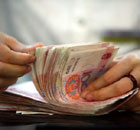-
-
China Daily E-paper
Editorials
Turn off the credit tap
(China Daily)
Updated: 2010-05-04 07:58
 |
Large Medium Small |
The People's Bank of China decided on Sunday to raise the deposit reserve requirement ratio for most financial institutions by half a percentage point to 17 percent from May 10. By removing about 300 billion yuan ($44 billion) from the domestic financial system, the central bank is signaling its determination to tighten credit supply.
It is still not clear if the latest move targets the rapid growth of bank lending, a result of the country's massive stimulus package to fight the global economic crisis. Though bank lending fell to 2.6 trillion yuan ($380.7 billion) in the first quarter this year compared with 4.58 trillion yuan in new loans in the same period last year, credit growth remains fairly strong by historical standards.
| ||||
However, no matter what the latest measure targets specify, it is now the consensus that Chinese policymakers need to rein in credit to keep price pressures under control.
China's economy expanded at its fastest rate in nearly three years within the first quarter. Though a dip in consumer inflation in March has for the moment delayed hawkish tightening measures from policymakers, signs of growth from the manufacturing sector in April and a jump in material costs have now added to the urgency to control credit.
Instead of applying interest rate hikes to curb inflation, the central bank has chosen to push up the reserves ratio closer to its record level.
This move is worrisome because hot money may surge due to interest rate hikes. But the main task for policymakers should be preventing asset bubbles and economic overheating.











